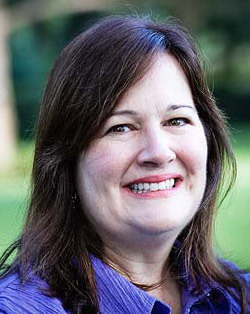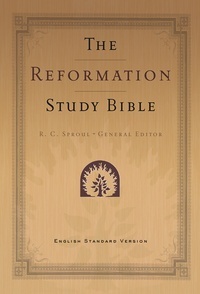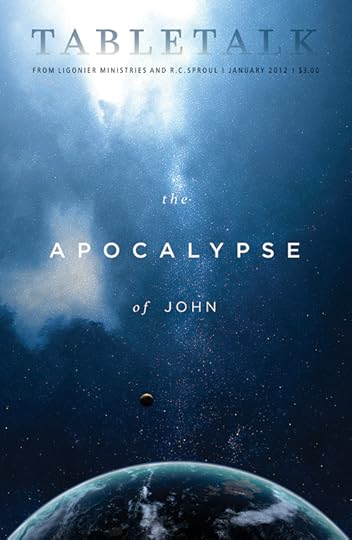R.C. Sproul's Blog, page 551
January 6, 2012
A Special $5 Friday in Memory of Denise Sproul
 Today we have a special $5 Friday in memory of Denise Sproul. Her book, Tending Your Garden, will bring refreshing encouragement to any wife and mother wholeheartedly desiring to see the fruits of righteousness in her home. A special thanks to Tolle Lege Press for partnering with us to make this possible.
Today we have a special $5 Friday in memory of Denise Sproul. Her book, Tending Your Garden, will bring refreshing encouragement to any wife and mother wholeheartedly desiring to see the fruits of righteousness in her home. A special thanks to Tolle Lege Press for partnering with us to make this possible.
Sale runs from 8 a.m. Friday through 8 a.m. Saturday EST.
View today's very special $5 Friday resource.
In honor of Denise Sproul, a scholarship fund was created to assist students at Reformation Bible College. If you would like to help, donations may be given to the Denise Sproul Memorial Scholarship Fund.

January 5, 2012
The Pursuit of Holiness: An Interview with Jerry Bridges
Tabletalk: What do you see as the greatest need in the church today?
Jerry Bridges: There are so many needs in the church today that it is difficult to single out one as the greatest. However, if I had to pick one, I would say the most fundamental need is an ever-growing awareness of the holiness of God. I don't say this because that is the main emphasis of Ligonier Ministries but because I believe it is true.
The emphasis of my own ministry has been the believer's personal pursuit of holiness. But years ago I came to realize the gospel has to be the foundation and motivation for the pursuit of holiness. Believers need the gospel to remind them that our standing with God is not based on our own obedience but on the perfect, imputed righteousness of Christ. Otherwise, the pursuit of holiness can be performance driven: that is, "If I'm good, God will bless me."
Our standing with God is not based on our own obedience but on the perfect, imputed righteousness of Christ. —Bridges
Continue reading The Pursuit of Holiness: An Interview with Jerry Bridges from the January issue of Tabletalk.

January 4, 2012
Introductions: Matthew

Who wrote it? When was it written and why?
These are some of the important questions to answer as you explore any book of the Bible. To aid you in your study of God's Word we're adapting and posting some of the detailed book introductions found in The Reformation Study Bible.
Today, please allow The Reformation Study Bible to introduce you to...
The Gospel According to Matthew
Author | Date & Occasion | Characteristics & Themes | Interpretive Difficulties
Author
Although this Gospel does not name its author, some early manuscripts have the inscription "according to Matthew," and Eusebius (c. A.D. 260-340) tells us that the early church father Papias (c. A.D. 60-130) spoke of Matthew as having arranged the "oracles" about Jesus. Subsequent tradition is unanimous that the disciple Matthew, also called Levi (Matt. 9:9-13; Mark 2:13-17), was the author of this Gospel, and not until the eighteenth century was this tradition doubted.
Tradition is unanimous that the disciple Matthew was the author of this Gospel, and not until the 18th century was this tradition doubted.
There are some problems with the tradition. First, Papias apparently said that Matthew "arranged the oracles in th Hebrew dialect." This statement seems to indicate that Matthew wrote in Hebrew or Aramaic, and scholars point out that Matthew does not read like a translation from these languages. It is also quite similar to Mark, which was certainly written in Greek. It is possible that Matthew wrote in both Hebrew and Greek, much as Calvin wrote works in both Latin and French.
Secondly, since Papias did not say "gospel" but "oracles," some have identified these "oracles" as one of the sources lying behind our Gospels. But Eusebius appears to have understood "oracles" to mean "gospel," and Irenaeus (writing about A.D. 180) speaks of a "gospel" by Matthew written "for the Hebrews in their own dialect."
Other objections to Matthew's authorship are more speculative. Some suggest that the Gospel may have been the product of a group of writers ("school"). Its alleged dependence on Mark and supposedly late composition (see "Date and Occasion") are given as reasons to doubt Matthew's authorship. But these objections do not disprove the tradition that Matthew was the sole author.
Since the author did not identify himself, he probably thought that it was not essential for his readers to know his name. Working through the human author was the primary Author, the Holy Spirit.
Date and Occasion
The earliest reference to the Gospel of Matthew is probably in the Epistle to the Smyrnaeans by Ignatius of Antioch (c. A.D. 110). Almost no one dates that book later than A.D.100. Some scholars have dated it as early as A.D. 50, but many critics date it after the destruction of Jerusalem, usually between 80 and 100. Their reasons include the assumption that Jesus could not have predicted such future events as the destruction of Jerusalem, the view that the Gospel's trinitarian theology (Matt. 28:19) and exalted christology (Matt. 11:27) are late ideas that developed in a Hellenistic environment, and the assertion that the word "Rabbi" (mentioned in Matt. 23:5-10) was not used as a title before A.D. 70.
An appropriate date for Matthew would be between A.D. 64 and 70.
Some of these reasons, such as that Jesus could not have predicted the future or that a high christology is Hellenistic and therefore late, are highly dubious and reflect a rejection of supernatural revelation. Further, there is some evidence in the context of the book that Matthew was written before the destruction of Jerusalem in A.D. 70. The Gospel warns against Sadducees, a group that rapidly declined from prominence after A.D. 70 and ultimatley ceased to exist. The language used to describe the destruction of Jerusalem in Matthew 24 reflects Old Testament prophecies of the divine judgment that Jesus foresaw as connected with the coming of His kingdom. There is no need to explain the content of Matthew 24 as the author's memory of a historical event.
The writer of this Gospel probably used the Gospel of Mark. Assuming that Mark was composed with the help of the apostle Peter in Rome, an appropriate date for Matthew would be between A.D. 64 and 70.
Antioch in Syria is the most likely location for the writing of the Gospel and for the church for which it was originally composed. Ignatius, the earliest writer to quote Matthew, was bishop of Antioch. The congregation in Antioch was of mixed Jewish and Gentile origin (Acts 15), and this would account for the problems of legalism and antinomianism that Matthew particularly addresses.
Characteristics and Themes
Like all the Gospels, Matthew's purpose is to convey authoritative teaching by and about Jesus, whose coming marks the fulfillment of God's promises and the presence of God's kingdom. Matthew makes no division between history and theology. His history is the basis of the theology, and the theology gives its proper meaning to the history.
Matthew's purpose is to convey authoritative teaching by and about Jesus, whose coming marks the fulfillment of God's promises and the presence of God's kingdom.
Matthew makes extensive use of "fulfillment" references to the Old Testament. His citations are not presented as isolated predictions and fulfillments, but as proof of the fulfillment of all the expectations of the Old Testament. This concern affects the way Matthew stresses certain elements in the history. Matthew shows us the illegality of the Sanhedrin's actions in the trial of Jesus (Matt. 26:57-68), the distortion of the Old Testament by the scribes and Pharisees (Matt. 15:1-9), and the covenantal nature of God's dealing with His people.
Also distinctive to Matthew is his presentation of the teaching of Jesus in five major discourses: ethics, discipleship and mission, the kingdom of heaven, the church, and the end time. These five divisions may have been patterned after the five books of Moses, to present Jesus as the Prophet like Moses of Deut. 18:18. Most scholars today recognize the five teaching discourses as the key to Matthew's basic design, especially since each discourse ends with an expression such as, "And when Jesus finished these sayings" (Matt. 7:28). Further, there seems to be a relationship between each discourse and the narrative preceding it. Also note that the narrative portions deal primarily with the question of the King's identity, while the discourse material tends to focus on the King's people.
Interpretive Difficulties
Scholars today are in general agreement that both Matthew and Luke made use of the Gospel of Mark in writing their own Gospels. However, Matthew and Luke do not follow Mark at every point in the order of events of Jesus' life, or the order of His teachings. Matthew and Luke have some material in common not found in Mark, but here too they differ in its placement within Jesus' ministry.
The three Synoptic Gospels are individual and complementary works... They offer Jesus Christ, the incarnate Word, to all generations.
To understand the chronology of the Gospels it is important to note that Mark's own account is not a complete diary. John reports that Jesus visited Jerusalem several times during a period of about three years, while in Mark the events are presented in what appears to be one year ending with a single, climactic visit to Jerusalem. In other words, the Holy Spirit had already led Mark in selecting and presenting the events of Jesus' ministry in a particular way. Matthew and Luke similarly were led by the Spirit in their own selection and presentation of events.
The Gospels do not simply present a schedule of Jesus' activities. Nor are they modern, technical biographies that follow methods unknown in their own day. The three Synoptic Gospels are individual and complementary works; they are not three incomplete attempts to do the same task. They are spiritual books; together with the Gospel of John they offer Jesus Christ, the incarnate Word, to all generations.
 Own The Reformation Study Bible and have access to more than 20,000 study notes, 96 theological articles, contributions from 50 evangelical scholars, 19 in-text maps and 12 charts.
Own The Reformation Study Bible and have access to more than 20,000 study notes, 96 theological articles, contributions from 50 evangelical scholars, 19 in-text maps and 12 charts.
Read Sample Chapters
Purchase The Reformation Study Bible
Adapted from The Reformation Study Bible, © 2005 Ligonier Ministries.

January 3, 2012
Revelation-Driven Life
God wins. If I had to summarize the message of Revelation in just two words, those would be my choice. They not only convey the point of the book but also hint at its main storyline. Despite what some overly speculative interpreters would have us believe, the main character in the last book of the Bible is not the Dragon, Beast, or False Prophet; rather, it is God. Revelation is primarily about Christ, not the Antichrist. And the main point of the book is to demonstrate in graphic imagery the victory of God in Christ.
Revelation is primarily about Christ, not the Antichrist. —@TomAscol
Through the incarnate ministry of His Son, God has conquered the Devil and his demons; the world and its deceptions; and sin and its destruction. Through faith in Him, we are also victorious over all these enemies. Because He wins, we also win. His victory secures ours. This truth provides fuel for an ever-increasing joy on the part of every believer.
Continue reading Revelation-Driven Life, Tom Ascol's contribution to the January issue of Tabletalk.

January 2, 2012
Get Free Tabletalk Devotionals Direct To Your Inbox In 2012
Thanks to Tabletalk Magazine and BibleGateway.com you have the opportunity to receive free Tabletalk devotionals direct to your email inbox throughout 2012.
Once you visit the BibleGateway.com Newsletters page you'll have the option to take a year long study through the Book of Matthew by selecting Tabletalk Devotions with R.C. Sproul or to be reminded each day to live your entire life in the presence of God, under His authority, and to His glory, by selecting Coram Deo: Daily Meditations on God's Presence.
Sign-up for free by visiting the BibleGateway.com Newsletters page and look for the two options as shown below.

Columns from Tabletalk Magazine, January 2012
 The January edition of Tabletalk is out. This month's issue explores various aspects related to the book of Revelation, including an overview of its content, a history of its major interpretations, applications of the real purpose of the book, and advice for how to live in light of this prophecy. Contributors include R.C. Sproul along with Tom Ascol, Jerry Bridges, Sinclair Ferguson, Dennis Johnson, Phil Johnson, Peter Jones, Keith Mathison, Kim Riddlebarger, R.C. Sproul Jr., and Cornelis Venema.
The January edition of Tabletalk is out. This month's issue explores various aspects related to the book of Revelation, including an overview of its content, a history of its major interpretations, applications of the real purpose of the book, and advice for how to live in light of this prophecy. Contributors include R.C. Sproul along with Tom Ascol, Jerry Bridges, Sinclair Ferguson, Dennis Johnson, Phil Johnson, Peter Jones, Keith Mathison, Kim Riddlebarger, R.C. Sproul Jr., and Cornelis Venema.
We do not post all of the feature articles or the daily devotionals from the issue, so you'll have to subscribe to get those. But for now, here are links to a few select columns and articles from this month:
The Beginning at the End by Burk Parsons
The Things of God by R.C. Sproul
Revelation-Driven Life by Tom Ascol
Eyes to See by R.C. Sproul Jr.
A Catechism on the Heart by Sinclair Ferguson
Salt of the Earth by Phil Johnson
The Pursuit of Holiness: An Interview with Jerry Bridges
One or Two? by Peter Jones
If you have not yet subscribed to Tabletalk, now is the perfect time. It's only $23 for a year, and $20 to renew. You save even more if you get a 2- or 3-year subscription (as little as $1.36 per issue). We offer special discounts for churches or businesses who want multiple copies of each issue.
Get your subscription to Tabletalk today by calling one of Ligonier Ministries' resource consultants at 800-435-4343 (8am-8pm ET, Mon-Fri) or by subscribing online.

Best of 2011: Ligonier Blog

To mark the beginning of this new year, we've gone back and collected some of the most popular blog posts of 2011.
5 Things I'm Surprised I Can't Find in the Bible by R.C. Sproul Jr.
"His Word is perspicuous, that is clear, and understandable. Not all of the Bible, however, is as clear as all the rest."
What Is R.C. Sproul's Position on Creation? by R.C. Sproul
"I trust Scripture before I trust the speculations and inferences of scientists."
Does Writing 'Xmas' Take Christ out of Christmas? by R.C. Sproul
"There’s a long and sacred history of the use of X to symbolize the name of Christ..."
The Legacy of R.C. Sproul and John Piper by Justin Taylor
"When their earthly course is completed, I believe this will be the legacy of R. C. Sproul and John Piper: they labored by the grace of God to leave us with a vision of God."
The End of the World According to Harold Camping by Robert Godfrey
"I first met Camping in the late 1950s...I pray for him that the Lord will deliver him from the serious errors into which he has fallen.
Deserving Nothing by Sinclair Ferguson
"Religious people are always profoundly disturbed when they discover that they are not, and never have been, true Christians."
Church History: Recommended Reading by Keith Mathison
"...what are some of the more helpful books for students of church history?"
The Place of God's Disfavor by R.C. Sproul
"I suppose there is no topic in Christian theology more difficult to deal with, particularly on an emotional level, than the doctrine of hell."
Parents, Give Children Clear Instructions by Joel Beeke
"Give children clear instructions. You will not have to employ corrective discipline as much when both of you understand what is expected."
The Reformation and the Men Behind It by Steven Lawson
"The Protestant Reformation stands as the most far-reaching, world-changing display of God’s grace since the birth and early expansion of the church...Who were the key leaders who stoked its flames?"
Thank you for your support as you've read and shared our posts with family and friends. We look forward, Lord willing, to another edifying and God glorifying year in 2012 on the Ligonier Blog.

January 1, 2012
Twitter Highlights (1/1/12)
Here are highlights from the various Ligonier Twitter feeds over the past week.
When fallen man is most religious, he is most rebellious (Guy Waters).
— Tabletalk Magazine (@Tabletalk) December 27, 2011
Ideas have consequences, not only for cultures, not only for nations, but for you and for me.- Dr. R.C. Sproul, President of RBC
— RefBibleCollege (@RefBibleCollege) December 27, 2011
Anyone who takes his faith seriously & speaks in behalf of Christ & His kingdom will be accused of fanaticism at some point. -R.C. Sproul
— Reformation Trust (@RefTrust) December 28, 2011
"mortification" -A theological term for the subduing or putting to death of the life of sin through repentance. -WDTT bit.ly/gdC6a0
— Ligonier Connect (@LigonierConnect) December 28, 2011
God has entrusted the ministry of the Word to us, not its results... —R.C. Sproul
— Ligonier Ministries (@Ligonier) December 29, 2011
In theology only the old is true, for truth must be old, as old as God himself (Spurgeon).
— Tabletalk Magazine (@Tabletalk) December 30, 2011
Did Christ die to make possible the salvation of all, or did He accomplish the salvation of His elect? Watch: bit.ly/spb6d0
— Ligonier Ministries (@Ligonier) December 30, 2011
You can also find our various ministries on Facebook:
Ligonier Ministries | Ligonier Academy | Ligonier Connect
Reformation Bible College | Reformation Trust | Tabletalk Magazine

December 31, 2011
What Now?
During my Denise's battle we were all needy enough that we asked for and welcomed prayers for all of us. The grave issue, the underlying problem, was of course her illness. I too prayed for strength for me, for peace for the children. I prayed that God would use the beauty of Denise's character to draw in the elect. Most of all, however, I prayed that Denise would be made well, that the cancer would be beaten, that she would be blessed with health, comfort and joy. It is rare indeed when we can see such specific prayers answered so clearly and powerfully.
For nine months I have awakened each morning knowing my wife was weak, fragile, fearful, weary and in pain. She was in danger of sinking deeper into illness. I knew it likely that when I would visit her she would at some point cry in sorrow, and that I couldn't fix it. I prayed against the weakness, the fear and fragility, the weariness and the pain. I prayed against the tears and the sorrow. And now my prayers have been heard. What we wanted for her she has received, and more. We, His children, all together asked for bread for her. He didn't give her a stone. He didn't give her bread. He gave her Jesus. She who awoke pity in the hearts of thousands now has awakened with Him, with more health, more comfort, more joy than all of us combined. Eye hath not seen nor ear heard, nor has it entered into the mind of man all that she has already been blessed with (I Corinthians 2:9).
What though of the rest of us, those left behind? We had prayed for strength, for perseverance, for peace. These prayers He has likewise heard. We are, by His grace, strong enough that we are still here, that we have persevered. And we are at peace in our confidence that He will continue to so bless. We have work to do. I have children to raise, and they have the fruit of the Spirit to cultivate. I have lectures to prepare, sermons to preach, articles and chapters to write, and the fruit of the Spirit to cultivate. But there's one more thing we have to do, me and my children, my extended family and friends. We need to mourn. A commitment to God's goodness in calling Denise home, a commitment to God's goodness in taking her from us, does not put mourning out of bounds. Jesus Himself wept just moments before He knew He would call Lazarus out of that tomb. I am not in the least ashamed of my tears. We mourn, but not as those who are without hope (I Thessalonians 4:13).
We do not fail in our work because we are mourning. We do not fail in our mourning as we work. We beautify each with the other. We will do both in accordance with our convictions. We mourn and we work with hope, knowing that all that we do for the kingdom will withstand that great conflagration of wood, hay and stubble.
Many of you, out of tender hearts, no doubt are concerned about practical matters, about logistics. Raising eight children is a jaw-dropping sized job for two healthy parents. Add in homeschooling and the challenge becomes more daunting. And now we go forward without my wife. What is the plan? The plan is to continue to honor both God's Word and Denise's legacy. We will continue to speak of Jesus and His kingdom when the children lie down and when they rise up. We will continue to homeschool the children. We will seek out more help around the house. I will seek to remove a few things from my plate, without sweeping its contents in the disposal. We will work hard and efficiently, still guided by the hand written lists and instructions Denise so loved to put together. I don't, now that she is gone, need to build the transcontinental railroad. I just have to keep the train on the track my wife has so lovingly built.
Prayers for strength, wisdom and perseverance, are of course not just welcomed but coveted. But do not pray as those who are without hope- that's just worrying on your knees. Instead pray with confidence to our loving Father. I know how powerfully He is not just able, not just willing, but how eager He is to bless, because I've seen what He has done for my wife. What now? Give thanks.

December 30, 2011
There's Still Time to Help Ligonier Sustain Its Momentum into 2012

Because I know you care about the ministry of Ligonier and understand the great need for the forthright proclamation of God's Word, I want to let you know that you have one final opportunity to help us meet our year-end need. Our ministry outreach is growing at an unprecedented rate, but we need your help to finish 2011 in a strong position. Sending your gift by Saturday will help us sustain our momentum into 2012 and close our budget shortfall.
Ligonier's uncompromising commitment to the sovereignty of our holy God puts us in a unique position to help satisfy the hunger for teaching that transforms the soul and equips people for effective ministry. You can stand with us when you make a donation through our secure website. Every gift received by 11 p.m. EST on December 31, 2011, will count toward our year-end need and qualifies for a tax deduction on your 2011 return.
Please stand with us so that as many people as possible can be awakened to the holiness of God in 2012. Thank your for your faithfulness.
Your servant in Christ,


R.C. Sproul's Blog
- R.C. Sproul's profile
- 1969 followers





